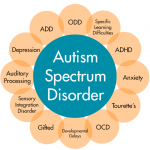
I was recently contacted by the Director of Autism and Brain Aging Laboratory at Arizona State University https://sites.google.com/a/asu.edu/braden-aba-lab/ to consult with them about using MBSR, Mindfulness Based Stress Reduction Program as an intervention for adults with Autism. They have already done a successful pilot program and are looking to further their studies. I may teach some classes and consult with the laboratory on the mindfulness intervention research. It makes perfect sense to me that MBSR is an effective intervention with this group.
Autism is a lifelong developmental disorder that affects functioning in multiple areas. Recent studies show that autism is often accompanied by other psychiatric problems, including depression, anxiety, hyperactivity, inattention and distress. Evidence points to depression being the most common psychiatric disorder seen in autism (Ghaziuddin et al., 2002). Especially adults with a relatively high cognitive ability tend to develop symptoms of depression, possibly because they are more aware ofexpectations of the outside world and their inability to meet those expectations.
An important aspect related to depression and distress in people with autism is the tendency to ruminate. This can be described as having repetitive thoughts, a process which is very difficult to stop. Adults with autism, for instance, often lay awake at night, pondering about the events of the day, analyzing them in detail. The tendency of people with autism to ruminate appears related to the detailed information processing style that characterizes autism.
Many studies have shown MBSR to be an effective intervention for all of these psychological problems and much more. I’m glad that it is now being offered to the adult Autism population. It will no doubt result in a higher quality of life for them.
